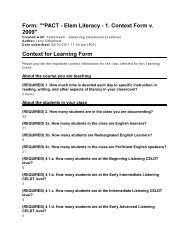The Tutoring Book - California State University, Sacramento
The Tutoring Book - California State University, Sacramento
The Tutoring Book - California State University, Sacramento
You also want an ePaper? Increase the reach of your titles
YUMPU automatically turns print PDFs into web optimized ePapers that Google loves.
try reassuring them that writing isn’t something that comes easily or naturally to even experienced writers<br />
like ourselves, that we, too, often find things like structuring an essay, carefully wording thesis<br />
statements, etc. to be frustrating, painstaking processes. That, as Thomas Mann put it, “A writer is a man<br />
to whom writing comes harder than to anyone else.”<br />
In my experience, such performance anxiety or fear of failure is one of the most common sources<br />
of passivity among tutees. While levelling with them in this way is certainly not a magic bullet that will<br />
instantly make them churn out A+ work, it may go along way in helping to build their self-confidence.<br />
And even if tutors accomplish nothing more than this, they’ve made no small contribution to their tutees’<br />
personal and academic development.<br />
As for tutees that really do seem to have something of a full-on attitude problem, I would<br />
recommend collaborating with them on reaching some mutual understanding of what the tutor-tutee<br />
relationship ought to be like. In doing so, you might have to explain that your purpose is not to get your<br />
tutees better grades but to help them become better writers and that because of reasons of academic<br />
integrity you cannot in good conscience simply hand over the “right” answers.<br />
This sort of misunderstanding of what the tutor-tutee relationship is occurs most frequently with<br />
drop-ins looking for quick fixes to their problems. Of course, not all drop-ins will be quite so<br />
disagreeable, but you’re sure to encounter at least a few of them. <strong>The</strong> problem with these tutees is that<br />
they may simply not understand what we’re trying to accomplish in having them think for themselves and<br />
reach their own conclusions. But if you can manage to convey to your tutees that there is real value in<br />
doing things the Writing Center way, they will understand their being active and enthusiastic<br />
collaborators is part and parcel of their becoming stronger writers. Given that all the empirical evidence<br />
supports this view, this shouldn’t be too hard to do.<br />
So far I’ve discussed only two types of passive tutees. As this is undoubtedly not an exhaustive list<br />
of all those one might encounter at the writing center, I also wanted to offer a few “high percentage”<br />
strategies that, while not sure-fire moves, work more often than not. <strong>The</strong> first was suggested to me by one<br />
of our many experienced tutors, Sarah Faye:<br />
Don't be scared of silence. Once you have asked your question, wait for the answer. Just sit<br />
there with an engaging smile, until the student will feel awkward for not answering. If you think<br />
the student did not understand the question, rephrase it, but don't answer it yourself. If there is<br />
still complete silence, ask a question about the question.<br />
Easy enough, right? If you’re worried that this approach might be a little time consuming (I can<br />
imagine some tutees turning such occasions into a game of chicken in which they try to make you feel<br />
even more awkward than themselves), I have a few suggestions of my own that might help keep things<br />
moving along. First, after initiating a brainstorming activity (or a similar activity), remove yourself from<br />
your tutee’s immediate environment. This strategy prevents the tutee from thinking that they can wheedle<br />
the answers out of you or wait for you to get frustrated and cut the activity short. It also has the added<br />
virtue of allowing you to take a break for a few minutes to get some coffee, stretch your legs, etc. If<br />
you’re still worried that after five or ten minutes of break time, your tutee will have nothing to show but a<br />
blank sheet of paper, you might also assign them some minimum amount of work you expect them to<br />
accomplish during their brainstorming session; when working on persuasive essays, for example, you<br />
might try asking them to come up with at least 3 different “pros” and “cons” for the position in question.<br />
If you’re worried that continually interrupting your sessions with these activities won’t leave you<br />
with enough time to read through their entire essay, simply make note of important issues as they come<br />
71

















